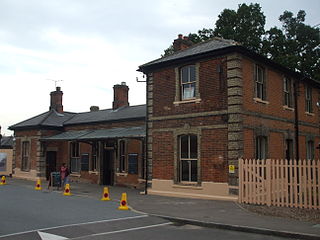
Blake Hall is a disused former station on the London Underground in the civil parish of Stanford Rivers, and south from the village of Bobbingworth in Essex. It was latterly on the Central line, between North Weald and Ongar, but was originally served by the Epping to Ongar shuttle service branch line.

North Weald railway station is on the Epping Ongar Railway, a heritage railway, located in North Weald, Essex.

Ongar railway station is a station on the Epping Ongar Railway heritage line, and a former London Underground station in the town of Chipping Ongar, Essex. It was opened in 1865 by the Great Eastern Railway, and became part of London Transport in 1949. Until its closure as such in 1994, it was the easternmost point of the Central line and the eastern buffers remain the point from which all distances on the London Underground are measured.

Epping Forest District is a local government district in Essex, England. It is named after the ancient woodland of Epping Forest, a large part of which lies within the district. The district covers northeastern parts of the urban area of London, including the suburban towns of Epping, Loughton, Waltham Abbey, Chigwell, and Buckhurst Hill, as well as rural areas beyond it. The district is situated in the west of the county, bordering north-eastern Greater London.

Chipping Ongar is a market town and former civil parish, now in the parish of Ongar, in the Epping Forest District of the county of Essex, England. It is located 6 miles (10 km) east of Epping, 7 miles (11 km) southeast of Harlow and 7 miles (11 km) northwest of Brentwood. In 2020 the built-up area had an estimated population of 6420.

The Epping Ongar Railway is a heritage railway in south-west Essex, England, run by a small number of paid staff and a team of volunteers. It was the final section of the Great Eastern Railway branch line, later the London Underground's Central line from Loughton via Epping to Ongar, with intermediate stations at North Weald and Blake Hall. The line was closed by London Underground in 1994 and sold in 1998. It reopened between 2004 and 2007 as a preserved railway, offering a volunteer-run Class 117 DMU service between Ongar and Coopersale. A change of ownership in 2007 led to the line being closed for restoration to a heritage steam railway, which opened on 25 May 2012.

Epping is a London Underground station in the suburban town of Epping in Essex, England. The station serves as the north-eastern terminus of the Central line. Located in Travelcard Zone 6, it is one of eight London Underground stations in the Epping Forest District. The station before Epping is Theydon Bois, which is about three minutes' travelling time away.

Abridge is a village in Essex, England. It is on the River Roding, 16 miles (26 km) southwest of the county town of Chelmsford. The village is in the district of Epping Forest and in the parliamentary constituency of Brentwood and Ongar. It is part of the civil parish of Lambourne and is served by Lambourne Parish Council.

Stapleford Abbotts is a village and civil parish in the Epping Forest district of Essex, approximately 5.5 mi (9 km) SW of Ongar, 4.5 mi (7 km) N of Romford and 5 mi (8 km) SSE of Epping. The whole parish is within the M25 motorway. The village covers 957 hectares and had a population of 959 in 2001, increasing to 1,008 at the 2011 Census.

North Weald Bassett, or simply North Weald, is a village and civil parish in the Epping Forest district of Essex, England. The village is within the North Weald Ridges and Valleys landscape area.
Ongar is a civil parish in the Epping Forest District in Essex, England. Other than the town of Chipping Ongar it also includes Greensted, Greensted Green, Marden Ash and Shelley. The local council of the parish is Ongar Town Council. Located approximately 21 miles north-east of London, it is a partially developed parish with large sections of open land.

Stanford Rivers is a village and civil parish in the Epping Forest district of Essex, England. The parish, which is approximately 11 miles (18 km) west from the county town of Chelmsford, contains the village of Toot Hill and the hamlet of Little End, both settlements larger than Stanford Rivers village, and the hamlet of Clatterford End. The village is 2.0 miles (3 km) south-east of Chipping Ongar, 3 miles (5 km) south-west of North Weald Bassett and 3 miles north-west of Kelvedon Hatch. The parish covers an area of 1,749 hectares.

Epping is a market town and civil parish in the Epping Forest District of Essex, England. Part of the metropolitan and urban area of London, it is 17 miles northeast of Charing Cross. It is surrounded by the northern end of Epping Forest, and on a ridge of land between the River Roding and River Lea valleys.

Greensted Green is hamlet in the Ongar civil parish of the Epping Forest district, in the English county of Essex. It is positioned at the western end of Greensted, slightly above 2 miles to the west of Chipping Ongar.

Toot Hill is a village in the Stanford Rivers civil parish in the Epping Forest district of Essex, England. It is 2.3 miles (4 km) south-west of Chipping Ongar and 3.5 miles (6 km) east of Epping. Toot Hill is less than a mile from the small hamlet of Clatterford End.

Hastingwood is a hamlet in the North Weald Bassett civil parish of the Epping Forest district of Essex, England. The hamlet is centred on the junction of Hastingwood Road, which runs southwest to the A414 road and the Hastingwood Junction 7 of the M11 motorway, and Mill Street, which runs north to Harlow Common and Potter Street. Nearby settlements include the town of Harlow, North Weald and the hamlet of Foster Street.

Colliers Hatch, is a hamlet in the civil parish of Stapleford Tawney in the Epping Forest district of the county of Essex, England. It is approximately 2 miles (3 km) east of Epping, 3.5 miles (6 km) west of Chipping Ongar and 7 miles (11 km) north of Romford. Colliers Hatch is 0.5 miles (0.8 km) north of the hamlet of Tawney Common, also in the Stapleford Tawney parish.

Tawney Common also known as Woodhatch, is a hamlet in the civil parish of Stapleford Tawney in the Epping Forest district of the county of Essex, England. It is approximately 2.5 miles (4 km) east of Epping, 4 miles (6 km) west of Chipping Ongar and 13 miles (20 km) west from the county town of Chelmsford. Stapleford Tawney is approximately 2 miles (3 km) to the south. Tawney Common is south of the hamlet of Collier's Hatch, also in the Stapleford Tawney parish.

Coopersale, also termed Coopersale Common, is a village in the civil parish of Epping, within the Epping Forest District of Essex, England. In 2018 it had an estimated population of 1019.























